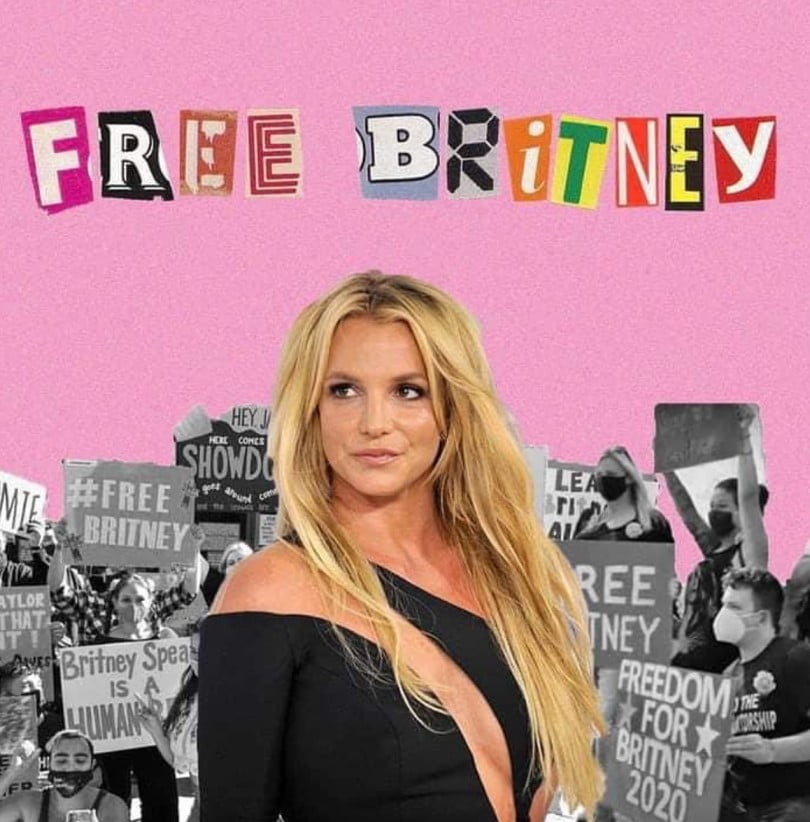
I’ll tell ’em what I like, what I want, and what I don’t
But every time I do, I stand corrected
Things that I’ve been told
I can’t believe what I hear about the world
I realize I’m overprotected
The calls for #freebritney has filled social media for quite some time now, but on the 23rd of june, the legendary pop icon’s testimony against her conservatorship shook everyone to the core. Britney spoke comprehensively about the appalling constraints her conservatorship had over her life, her finances and most unnervingly, on her body. Her allegations were disconcerting and included her being forced to take multiple drugs and of her being forced to work seven days a week. But what shed a blanket of consternation upon all was her allegation that she had been fitted with an IUD, a contraceptive intrauterine device, against her will and she had no authority to remove it. Britney Spears symbolises power for many, with her music always iterating owning one’s sexuality. Unfortunately, she has been robbed of such power in her private life , professedly for her own good.
Britney’s tribulations, alas, are not the first of its kind. The advent of modern medicine brought with it numerous new facets, including the revolutionary methods of contraception. Along with the latter arose an ongoing argument, of women’s agency over their own bodies. Since the 1800’s, rooted in eugenics, procedures such as ovariectomies, where the ovaries were surgically removed thus inducing menopause, have been employed so as to treat surmised mental illnesses. The ableism that is concrete in the mind of many governments has also manifested into state ordered sterilization of multiple individuals for a long time.
As one reads of such atrocities, the question that ought to arise is, ‘do we not have a human right against such savagery?’ and the answer to such is that there is. Reproductive justice is the ‘human right to maintain personal bodily autonomy, have children, not have children, and parent the children we have in safe and sustainable communities’, as according to SisterSong, the largest multi-ethnic reproductive justice collective. With roots in the coloured feminist-reproductive movement in the America, reproductive justice has garnered attention and has blossomed into a movement of its own. In 1994, ahead of the International Conference on Population And Development in Cairo, the streets of Chicago witnessed a gathering of black women, who agnized that the women’s rights movement, then being led by White, middle-class women, could not secure the rights of the Women of color and other marginalized groups. They christened themselves the Women of African Descent for Reproductive Justice, and thus came to life the Reproductive Justice movement. An awe-inspiring aspect of this movement is how it is rooted in the principles of intersectionality.
According to SisterSong, Reproductive Justice is about access, as opposed to choice. They recognize choice as necessary, but emphasize the need for increasing access. Also, as reflected in the eclectic definition, its not merely about abortions, contraception, comprehensive sex education, STI prevention and care, alternative birth options, adequate prenatal and pregnancy care, domestic violence assistance, adequate wages to support our families, safe homes and much more as aspects of Reprodcutive Justice.
While reproductive rights of an individual relates to the legal right to access reproductive health services, reproductive justice conjoins reproductive rights with social justice. This revolutionary movement envisions the organization of individuals and their communities, and to question the structural inequalities in power. The Reproductive justice framework, one with roots in the UN Human Rights Convention, is one that seeks to address the inequalities that exist, specifically that of unequal opportunities. To understand this better, in Britney’s case, though she has a removable IUD, the fact that she cannot remove such out of her own volition directly points to her having been stripped of making reproductive choices, and hence a reproductive justice issue. As abhorrent as Britney’s situation is, it’s not the worst of such practices. Women With Disabilities (WWD) have perpetually been victims of forced sterilization and other reproductive injustices. The belief that many WWD do not or can not understand the subtleties of sexual intercourse, pregnancy, childbirth and motherhood has led to them being deprived of their sexual and reproductive autonomy.
#freebritney
A 39 year old woman, with two teenage children begging to a judge to free her from what can only be described as invisible shackles binding her body seems like something out of a dystopian piece of fiction, and yet its happening, to Britney Spears, to a Rich, White woman in a country that prides itself on its liberty. While her tragedy most definitely cannot be ignored, it must be the spark that ignites in your mind a fire to question the justice, or lack thereof, relating to reproduction and bodily autonomy in our community. Being a country where sexuality in itself is considered taboo, and sex education is one of the most stigmatised fields of education, India has a long way to go. The freedom we do have, must be employed so as to forward it, to ensure that everyone avails it, because freedom is not for the timid.

Gouri N
Gouri is a 21 year old Law student from Kerala.



